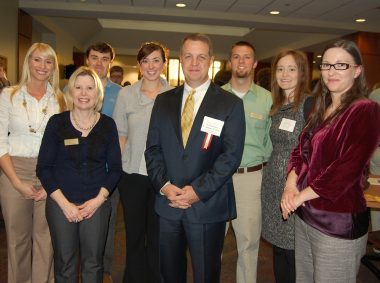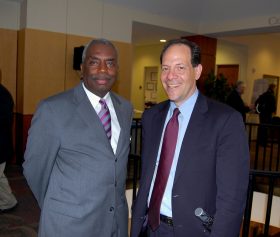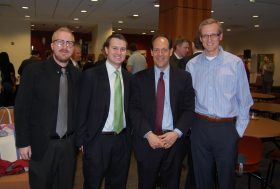The featured guest at Elon Law's March 10 reception with the legal community was the Honorable V. Stuart Couch, appointed by U.S. Attorney General Eric Holder in October 2010 to serve as an Immigration Judge in the Charlotte Immigration Court.

Couch, who served in private practice and in the U.S. Marine Corps for 22 years, as a pilot, a prosecutor, and an appellate judge, prior to his appointment as an Immigration Judge, noted in remarks at the law school that there are 11 million undocumented aliens in the United States and an estimated 400,000 in North Carolina.
As a result of prominent debate about immigration policy in the United States, Couch said that the Immigration Court operated under a degree of scrutiny, but that the application of law remained the fundamental work of the court.
“If we have duly enacted laws of immigration they have to be enforced, otherwise the rule of law is not upheld,” Couch said.
Applying the law correctly does not diminish the significance of individual circumstances that the Immigration Court considers in hearing more than 4,000 illegal alien removal cases each year, Couch said.
“In our jurisprudence and really in our character in America is the dignity of every human being, that every human being is entitled to respect,” he said.
In 1998, Couch served as one of three criminal prosecutors in general courts-martial at Camp Lejeune, North Carolina, involving the collision of a military jet with an Italian ski gondola system that caused the deaths of twenty European tourists.

Following practice in a civilian law firm and as an assistant district attorney in Beaufort and New Bern, North Carolina, he returned to the Marines on active duty as the senior prosecutor at Camp Lejeune after the 9/11 terrorist attacks against the United States.
From 2003 to 2006, Couch was assigned as a senior prosecutor in the Office of Military Commissions to conduct criminal proceedings against selected detainees held at Guantánamo Bay, Cuba.
He was lead counsel in the case of Salim Ahmed Hamdan, and liaison to the Department of Justice and Solicitor General in support of the U.S. Supreme Court litigation of Hamdan v. Rumsfeld, a landmark case involving separation of powers and Presidential authority during wartime.
Judge Couch was later featured in The Wall Street Journal about his decision not to prosecute a Guantánamo detainee because of his concerns that the man had been subject to torture.
As a result of his actions, he was awarded the American Bar Association’s 2007 Norm Maleng “Minister of Justice” Award, and the German Bar Association’s 2009 “Pro Reo” Award in Berlin.

From 2006 until his retirement, Judge Couch served for three years as a Senior Appellate Judge on the U.S. Navy-Marine Corps Court of Criminal Appeals in Washington, DC. His military awards include the Legion of Merit, the Department of Defense Meritorious Service Medal, and other decorations.
Additional speakers at the event included Glenn Fine, Inspector General of the U.S. Department of Justice from 2000 to 2011, who spoke earlier in the day to Elon Law students and faculty. Click here for details about his presentation.
Elon University President Leo M. Lambert announced that he had asked law school Dean George Johnson to join the senior staff of the university, noting Johnson’s broad experience in higher education and legal education.
Student Bar Association President Danny Lyon delivered announcements about upcoming events at the law school, and expressed appreciation to fellow students for the opportunity to serve them and to advance their interests throughout the academic year.

Click here for a report on the February reception with the legal community at Elon Law, featuring The Honorable Catherine C. Eagles, U.S. District Court Judge for the Middle District of North Carolina.


